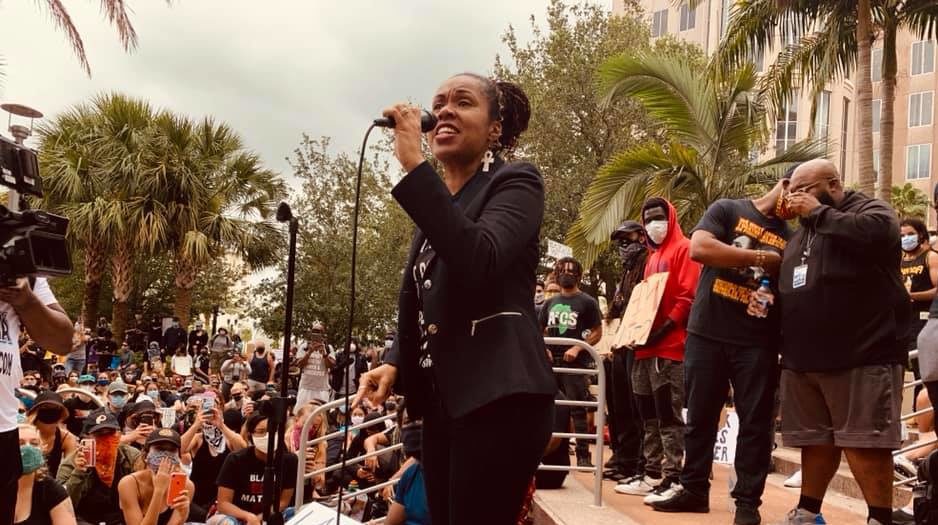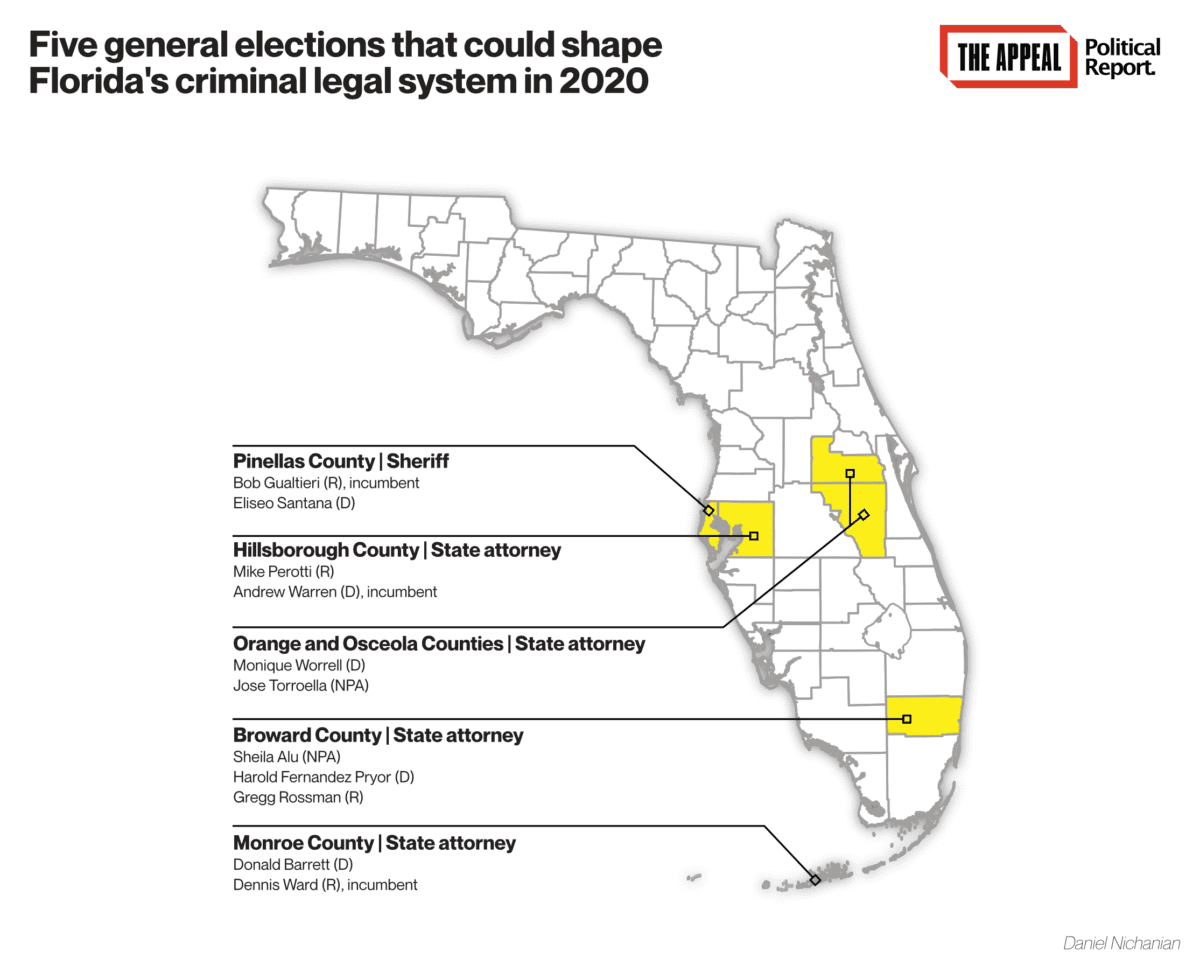Progressive Candidate Wins Orlando’s Primary for Prosecutor, and Four Other Florida Takeaways
In Florida’s primaries, voters set up November clashes on criminal justice, multiple sheriffs lost re-election bids, and Miami’s prosecutor secured a new term.
| August 19, 2020

This article originally appeared on The Appeal, which hosted The Political Report project.
In Florida’s primaries, voters set up general election clashes on criminal justice, multiple sheriffs were ousted, and Miami’s prosecutor effectively secured a new term.
Florida’s Aug. 18 primaries were marred once more by the exclusion of hundreds of thousands of voters due to harsh felony disenfranchisement statutes and to the confusion wrought by the state’s 2019 mandate that people with felony convictions pay off their court debt before voting.
Voters in Orlando’s metropolitan region still signaled for the second time in four years that they wanted the state’s Ninth Judicial Circuit to embrace criminal justice reform.
Monique Worrell, the most progressive candidate in a four-way Democratic primary for state attorney in Orange and Osceola counties, prevailed on Tuesday. She will be heavily favored to win this blue jurisdiction in November against independent candidate Jose Torroella.
“Our communities cried out for criminal justice reform, and their cries were answered,” Desmond Meade, the executive director of the Florida Rights Restoration Coalition who supported Worrell, wrote on Twitter on Tuesday night.
In 2016, Aramis Ayala won the prosecutor’s race with a reform-minded platform, becoming the first Black state attorney in Florida’s history. During her term, Ayala clashed with other public officials who pushed back against her agenda. When Ayala announced a policy of never seeking the death penalty. Republican Governor Rick Scott stripped her of cases eligible for the death penalty. Ayala, who is one in a number of Black women prosecutors nationwide who have faced retaliation for promoting criminal justice reform, pointed to that war of attrition last year to explain her decision to not seek reelection.
“Ayala has been a nationally visible leading proponent of criminal justice reform, and any time that happens, there are folks that either want to turn back the clock or advance the momentum,” Micah Kubic, executive director of the ACLU of Florida, told Samantha Schuyler in The Appeal: Political Report this month. “That is what is on the ballot on the 18th of August.”
Worrell’s primary win is a vindication for Ayala, who endorsed her. Worrell, who worked as the head of the conviction integrity unit in Ayala’s office, was also backed by other prominent progressives, such as U.S. Senator Bernie Sanders of Vermont.
But if she wins in November, Worrell would face a broadly similar political context as Ayala since Republicans still run the state government. The shadow of retaliation was evident during the primary campaign, Schuyler reported. Worrell has not reiterated Ayala’s pledge to never seek the death penalty, and she said she is aware that reform opponents “will use any means necessary.” Other candidates indicated they were likelier to roll back Ayala’s policies.
One of Worrell’s most significant commitments involves youth justice: She said she would not use Florida prosecutors’ unchecked discretion to “direct file” a case involving a minor in adult court, unless there is “loss of life.” As Schuyler wrote, “Florida transfers more children into the adult system than any other state in the country,” most of them for nonviolent offenses.
Worrell also participated in Black Lives Matter protests in Orlando in June. “If you want to change the system, you must change the player,” she said in a speech at a rally.
As state attorney, Worrell would at least not have to contend with one of Ayala’s chief local adversaries, Osceola County Sheriff Russ Gibson. Gibson, who complained to Scott about Ayala’s death penalty position, lost his re-election bid in a Democratic primary on Tuesday to Marco Lopez. Lopez did not respond to a request for comment.
There were many other elections for prosecutor and sheriff on Tuesday.
A new prosecutor in Broward County
Further south, in Broward County, the prosecutor’s office will most likely undergo reforms after 44 years under the same state attorney who managed it with a punitive outlook. But the county came within two percentage points of veering far further to the left.
Harold Fernandez Pryor, a defense attorney and former prosecutor who ran on qualified reform proposals, won the Democratic primary with 21.2 percent of the vote. Joe Kimok, a Bernie Sanders-endorsed defense lawyer and former prosecutor who ran as the most decarceral candidate, ended up as the runner-up in this eight-way race, with 19.9 percent of the vote. Kimok had pledged to not prosecute cases linked to marijuana, sex work, and poverty, and to end the use of cash bail, as Jerry Iannelli reported in the Political Report last week. The candidate endorsed by the retiring prosecutor, who was least sympathetic to reform, came in third, and the candidate endorsed by the local police union came in fifth.
Pryor is now heavily favored to be the county’s first new state attorney since 1976. In this blue bastion, he will face independent Sheila Alu and Republican Gregg Rossman in November. If he wins, he would be Broward’s first Black state attorney.
Pryor has promised “change from within,” but did not respond to Iannelli’s questions on what exact policies he would implement to make it so. He has said he opposes the use of cash bail for lower-level offenses; he has also said he would advocate for repealing Florida’s “Stand Your Ground” law. In a questionnaire with the Orlando Sun Sentinel, he mentions “combating racial sentencing disparities in the criminal justice system” as one of his three priorities; asked how he would lower disparities, he mentions changes in office culture, including recruiting “a diverse force of prosecutors,” implicit bias training, and audits, though not changes to charging and sentencing policies. He also tells the Sun Sentinel he will be open to seeking the death penalty.
Miami’s longtime prosecutor secures a new term
Miami-Dade County’s 27-year state attorney, Katherine Fernandez Rundle, defeated reform challenger Melba Pearson by a comfortable margin on Tuesday.
The election drew most attention in recent weeks due to Rundle’s record on law enforcement oversight. She has never charged a police officer for killing someone while on duty; she also took no action in 2012 when four prison guards allegedly placed a man under a 180-degree shower for hours until he died. Rundle, who will face no opponent in November, stressed in her victory speech that she had heard her critics and would re-examine Miami’s system.
Sheriffs ousted in Alachua and Clay counties
In Alachua County (Gainesville), Sheriff Sadie Darnell lost against Clovis Watson Jr., a legislator and former police officer, in a Democratic primary unfolding against the backdrop of COVID-19 outbreaks in the local jail. Watson has indicated some support for policing reforms, including fewer arrests over low-level offenses. The results could be felt in statewide politics: Darnell, who endorsed Republican Rick Scott in the race for U.S. Senate in 2018, is the former president of the state’s sheriffs association. The Gainesville Sun’s editorial board notes that Watson has backed reforms the association has fought, such as reducing mandatory minimums.
In Clay County, Sheriff Darryl Daniels lost to Michelle Cook in the Republican primary over an abuse of power scandal that led to his arrest last week. Separately, in June, he released a video warning Black Lives Matter protesters that he would “handle” them by making “special deputies” out of the county’s gun owners.
In other closely watched primaries, the incumbent sheriffs prevailed in Broward County, Hillsborough County (Tampa), and Orange County (Orlando).
Voters set up the general election
Of the 19 judicial circuits that are electing prosecutors this year, just 6 will feature multiple candidates in November—and most of those are highly unlikely to be competitive because of how staunchly they lean toward one party or the other.
Two districts could be competitive. In the 13th (Hillsborough County, Tampa), Democratic incumbent Andrew Warren is allied with reform DAs nationwide. He faces Republican Mike Perotti, who works at the sheriff’s office and criticized Warren for his reform outlook when he launched his bid. “Decriminalization, reduced sanctions, and justice reform cannot overshadow individual accountability and victim advocacy,” he said in a statement declaring his candidacy in February. In the 16th (Monroe County, Key West), Republican incumbent Dennis Ward faces Democrat Donald Barrett, who mentions among the reasons for his run that he is looking for alternatives to “warehousing people in jails.” But his campaign website currently provides no policy commitments. Barrett also used to work as the county’s chief deputy prosecutor under Ward.
The state’s most consequential county-level election this fall may be the sheriff’s race in swing Pinellas County (St. Petersburg).
Republican incumbent Bob Gualtieri is a nationally prominent sheriff who has championed closer cooperation with ICE and advocated arming teachers in the wake of the Parkland High School mass shooting. On Tuesday, Democrats nominated Eliseo Santana, a former communications maintenance supervisor at the sheriff’s office, who has stressed wanting to counter the “militarization” of police and roll back Gualtieri’s assistance with federal immigration enforcement. He also said in a League of Women Voters’ questionnaire that he “agree[s] with the strategy” of reallocating funding toward social programs. “Crime does not exist in a bubble, and we need a whole-community approach to addressing it,” he writes.

Florida is voting for all of its elected sheriffs this year, and all but one of its state attorneys.

